Ibn Rajab

In the Name of Allâh, the Most Beneficent, the Most Merciful
Imam Ibn Rajab al Hanbali (736 - 795 AH) He was the noble Imaam, the Haafidh, the Critic, Zayn-ud-Deen ‘Abdur-Rahmaan bin Ahmad bin ‘Abdir-Rahmaan bin al-Hasan bin Muhammad bin Abil-Barakaat Mas’ood As-Salaamee Al-Baghdaadee (due to his place of birth), Al-Hanbalee (due to his madh-hab), Ad-Dimashqee (due to his place of residence and death). His kunyah was Abul-Faraj, and his nickname was Ibn Rajab, which was the nickname of his grandfather who was born in that month (of Rajab).
He was born in Baghdad in 736H and was raised by a knowledgeable family, firmly rooted in knowledge, nobility and righteousness. His father played the greatest role in directing him towards the beneficial knowledge.
Al-Haafidh Ibn Rajab, may Allaah have mercy on him, was deeply attached to the works of Shaikh-ul-Islaam Ibn Taimiyyah, for he would issue legal rulings according to them and would constantly reference his books. This is since he served as a student under Ibn Qayyim al-Jawziyyah, the most outstanding student of Shaikh-ul-Islaam Ibn Taimiyyah, may Allah have mercy on all of them. But in spite of this, he (rahimahullaah) wasn’t a blind follower or a fanatical adherent (to his teacher). Rather, he would review, authenticate, verify and follow the evidences.
Al-Haafidh Ibn Rajab, may Allaah have mercy on him passed to the realm of the Akhira in Ramadaan, 795H. He died while in Damascus.
The Key to Paradise
It was said to al-Hasan, 'People say that whoever says, 'None has the right to be worshipped,' shall enter Paradise.' He said, 'Whoever says, 'None has the right to be worshipped save Allah,' and fulfils its obligations and meets its requirements, shall enter Paradise.' Wahb ibn Munabbih was asked, 'Is not the testification that 'none has the right to be worshipped save Allah' the key to Paradise?' He replied, 'Of course, but every key has its teeth; if you bring a key that has teeth, the door shall open; but if not, it will not.'
|
The Legacy of the Prophet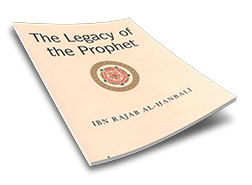
In this treatise, the author, ibn Rajab sets out to explain the advice the Prophet (SAW) imparted to ibn Abbas (radiyAllahu'anhuma), 'Safeguard Allah and He will safeguard you. Safeguard Allah and you will find Him in front of you. Know Allah in times of ease and He will know you in times of hardship. When you ask, ask Allah. When you seek aid, turn to Allah. The Pen has dried (after having written) all that will occur...'
|
A Collection of Knowledge and Wisdom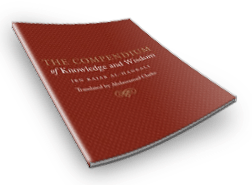
This is an English translation of Ibn Rajab al Hanbali's classic work Jami'al Ulum Wal Hikam. It is basically a listing of 50 ahadith (sayings of the Prophet), and along with them are comments, lessons to be learned from them, and sayings of the Sahaba regarding them.
|
The Excellence of Knowledge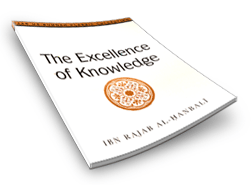
The Virtue of the Salaf Over the Khalaf (Ibn Rajab al-Hanbali). These are some brief words about the meaning of knowledge and its classification into that which is beneficial and that which is not; as well as a note regarding the excellence of the knowledge of the Salaf over that of the Khalaf. The way and wisdom of the Salaf, all goodness lies in traversing the way of the Salaf, beneficial Knowledge with regards the ?Inner Sciences?, the foundation of knowledge and many other branches of the beneficial knowledge.
|
The Journey to Allah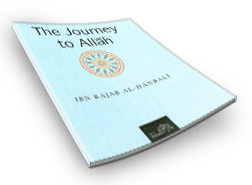
By al-Hafiz Ibn Rajab al-Hanbali. Bukhari records on the authority of Abu Hurayrah that the Prophet (pbuh) said, 'Your actions alone will not save any of you.' They asked, 'Messenger of Allah, not even you?', He replied, 'Not even me, unless, Allah were to envelop me in His mercy. Be firm; steadfast and balanced; and journey [to Allah] in the beginning of the day, the end of the day, and a portion of the latter part of the night. Moderation, moderation! Through this you will attain your goal!" He also recorded this hadith in another place with the wording, 'This religion is easy, none makes it hard upon himself except that it overwhelms him; therefore be firm, steadfast, and balanced; upon which have glad tidings! Seek help in this by journeying [to Allah] at the beginning of the day, at the end of the day, and a portion of the latter part of night.'
|
The Evil of Craving for Wealth and Status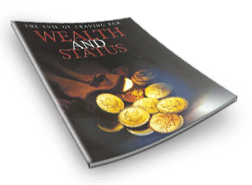
Imaam al-Haafidh Ibn Rajab al-Hanbalee
Many a man has led his soul into destruction by that which he covets. Desiring the riches of this world, recognition and authority amongst the people ? it was a trial for the nations of the past and many of us relentlessly chase after it today. We hope that this valuable book highlights the evil consequences of craving after wealth and status and how that can corrupt the Deen of the Muslim. We pray that this realisation causes our brothers and sisters to race one another in hastening towards forgiveness from Allaah, seeking the best provision in the Hereafter ? aameen. This is the English translation of the book Sharh Hadeeth Maa Dhi`baan Jaa`I?aan.. (Explanation of the Hadeeth: Two Hungry Wolves??) by the esteemed scholar of Ahlus-Sunnah wal Jamaa?ah, Imaam al-Haafidh Ibn Rajab al-Hanbalee (d.795h). |
The Humility in Prayer
Ibn Rajab al-Hanbali This is a treatise we have written concerning humility (Khushu') and the hearts meekness and breaking (inkisar) before the Lord. The basic meaning of Khushu', is the softness of the heart, its being gentle, still, submissive, broken, and yearning. When the heart is humble, so too is the hearing, seeing, heard, and face; indeed all the limbs and their actions are humbled, even speech. This is why the Prophet (saw) would say in his bowing (ruku), "My hearing, sight, bones, and marrow are humbled to You," another narration has, "and whatever my foot carries." One of the Salaf saw a man fidgeting in his prayer and remarked, 'If the heart of this person was humble, so too would his limbs be.' The source of the Khushu, that takes place in the heart is the gnosis of Allah's greatness, magnificence, and perfection. Teh more gnosis a person has of Allah, the more Khushu' he has. The greatest action of worship which manifests the Khushu, of the body to Allah is the prayer (Salaah). Allah has praised those who have Khushu' in the prayer.
|
Bid'ah
By Ibn Rajab al Hanbali. The Islamic definition of Bid?ah: Imaam Ash-Shaafii, may Allaah have mercy upon him, said: A Bidah is anything that has no basis in the Qur?aan, Sunnah or sayings of any of the companions. Ibn Al-Jawzi, may Allaah have mercy upon him, said: A Bidah is any form of worship that did not exist (at the time of the Prophet sallallaahu alayhi wa sallam and his companions) then later it was innovated. Ibn Rajab, may Allaah have mercy upon him, said: A Bidah is any form of worship which has no basis in the Sharee?ah which would warrant its legislation.?
|
Taqwa: The Provision of Believers
According to the earliest sources, compiled from the works of Ibn Rajab al-Hanbali, Ibn al-Qayyim al-Jawziyya and Abu Hamid al-Ghazali. Taqwa is an abundant treasure, a precious trait, an honourable substance, a great success. Those who have Taqwa are the friends of Allah. Allah has promised them success at the time of death and and deliverance from Hell on the Day of Judgment.
|
The Ghurabah This book is a translation of a short treatise entitled Kashf-ul-Kurbah fee wasfi Haali Ahlil-Ghurbah, or Alleviating Grievances in Describing the Condition of the Strangers, written by the great Imaam, Al- Haafidh Zayn-ud-Deen Ibn Rajab Al-Hanbalee, rahimahullaah. In this treatise, Ibn Rajab deals with the topic of the Strangers, or Al-Ghurabaa. He begins by listing the many ahaadeeth reported about them, in which the Messenger of Allaah describes their attributes and explains their position. They are given this name because they will be strange during the Last Days, due to their adherence to the Sunnah and to the Way of the First Muslims, the Salaf As-Saalih. So just as those who first accepted Islaam at the hands of Muhammad (saws) were considered strangers with their families and close ones, then indeed, those who adhere to the Sunnah in the last Days, when innovations and misguidance are rampant and widespread, will also be considered strangers amidst their families and close ones, not to mention the disbelievers. |







0 Comments